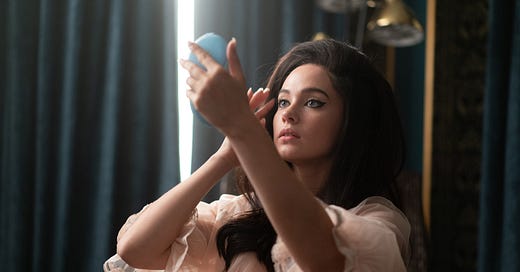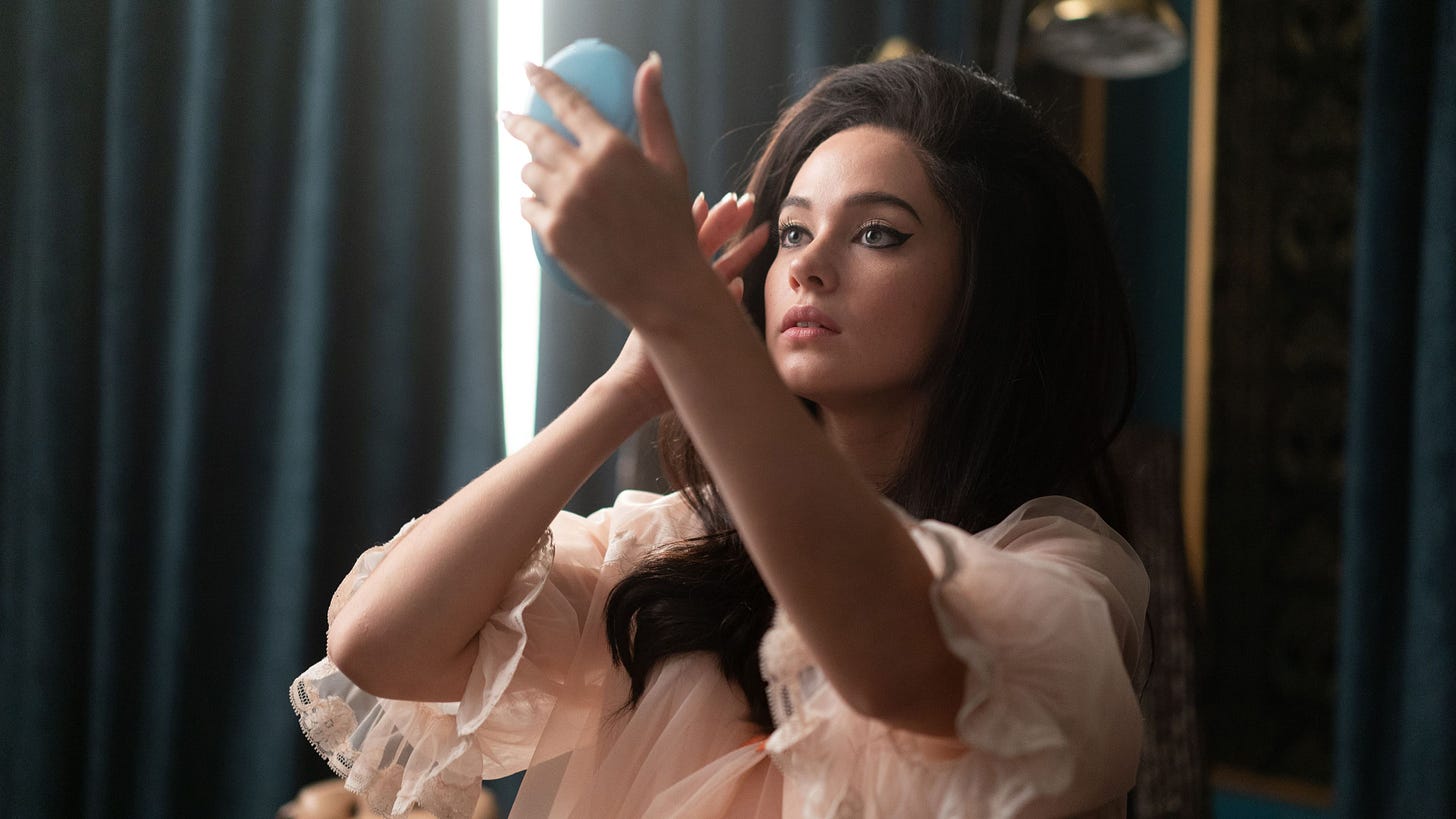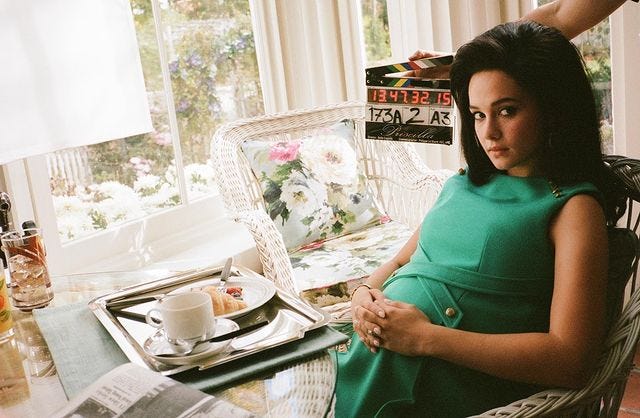We Need To Talk About Priscilla
‘Priscilla’ was calling my name so I ran back to NYFF like the tomb raider.
This close read took several weeks in the making. Although, given the opportunity to see the film early, I spent time to process things. So with love…
Major spoilers for PRISCILLA below.
As overdone as it may seem, there’s a particular lyric from Taylor Swift that haunts me every now and then: “Give me back my girlhood, it was mine first,” the acclaimed singer-songwriter croons in Would’ve, Could’ve, Should’ve, a bonus track of her tenth album, Midnights, which expresses guilt for a past relationship given its power imbalance and the trauma she bears. Sonically or not, those words can resonate with you. It answers the future question: How does it feel to be a girl whose innocence unwillingly is stripped away or to be giving it up for something you believe is worth more: love? But Sofia Coppola’s Priscilla movie contains the latter of the season.
Based on the memoir Elvis and Me by Priscilla Beaulieu Presley, Priscilla, covers the perspective of a younger Beaulieu through the early years and the fall of her marriage with Elvis Presley. Their relationship, to put lightly, was complicated: Their courtship began in 1959, when she was 14 and he was 24. But unlike Baz Luhrmann’s ostentatious Elvis biopic, the Priscilla movie doesn’t shy away from this information. After asking her parents if she can meet him, Priscilla (Cailee Spaeny) is chauffeured to a party where she sees Elvis (Jacob Elordi) sitting behind a piano, surrounded by people who adore him. She catches his eye and they become friendly. He poses questions about her life on a Germany army base, the sort of music teenagers enjoy, and finally her age. Beaulieu lets him know she’s in the ninth grade which tells Presley enough about her. He even replies,“Well, you’re just a baby.”—but that doesn’t cease the “King of Rock and Roll” from wooing her. Elvis later invites her to his bedroom and shows his sensitive side, relating to Priscilla’s homesickness and his grief over his late mother.
If that sounds cautionary, it’s because it is: watching one of the first grooming tactics steadily unfold pushes you to the edge of cringe-inducing, valid discomfort. But Jacob manages it with such feeling and charisma, the audience falls under his spell while they’re aware that doing so rebels against casting Presley as the villain. It’s clear why this situation happens to Beaulieu: Elordi’s portrayal is quite similar to Josh Hartnett’s Trip Fontaine in The Virgin Suicides. He looks attractive, he looks promising, and he’s so tall (6’5, 197 centimeters, a foot taller than Cailee). Physically he is who people deem to be known for their looks and magnetism towards women. However, Elvis is not a golden boy trying to win the unattainable girl’s heart. He is a grown man with knowledge of their age difference, pursuing Priscilla under the possibility and guarantee that she’ll soon be his and a part of the world that comes with him.
While Priscilla believes that her iconoclastic romance with Elvis is decorous, Coppola’s filmmaking—visually and rigorously—shares a great dichotomy of Beaulieu’s memories of her life with him. Almost every joyous moment is followed by one just as dark and solitariness: Priscilla first enters the legendary property, Graceland, then Elvis introduces her to sedatives; Presley takes her shopping then controls what she wears; a new dress requires a new handgun; bonding with her dog outside is “public display,” late-night fun shifts to daunting junctures; staying awake in class entails amphetamines; Before long, only waiting for Elvis at home equals knowing of his infidelity. Priscilla can’t work at a local store because she might not be there if he calls. Her routine toes between the line of dolling herself up as a sign of respect and fulfilling Presley’s desires. Believe it or not, she uses the Graceland furniture like props, adjusting her face and posture, rehearsing for encounters with him. And when he returns, Elvis compares Beaulieu to older, venereal women yet persuading her to be the antithesis.
Little by little, all this makes Priscilla grow disenchantment in “The King” and his castle, which extends once she receives her diploma. Her physical environment is also ringed by other men, the Memphis Mafia, who constantly allow Presley’s behavior. At one point of the film, they’re in his office, listening to demos, and he asks for Beaulieu’s opinion. She softly voices her thoughts: “I don’t know if I like it.” Presley then switches his approach, now more cold, and doesn’t understand what Priscilla means by not knowing. She tries to speak again but abruptly hears a Memphis Mafia guy shout “Watch out,” as soon as Elvis throws a chair at a wall near her. Beaulieu is shocked by his mood shift and the focus stays on her, showing her internalize everything meanwhile Presley grows apologetic and Memphis Mafia remain taciturn.
The promised fairy-tale has costs: Priscilla’s girlhood, freedom, and most of all … her time. Over the years, Beaulieu’s hair only gets longer, darker, and bouffant, a reference to her journey through the years with Elvis. It’s nearly impossible not to think of Kirsten Dunst in Marie Antoinette (2006), wandering Versailles after her marriage to the dauphin. Spaeny (age, 25) whose Volpi Cup-winning performance spans the ages 14 to 30, fills her role with nothing but authenticity. Onscreen, she is initially convincing as teenage Priscilla: Girlish tenderness and charm, in addition to ponytails, ‘50s poodle skirts, and penny loafers, subsequent to petulant outbursts—the way she yells “What?! I’m not going!” when Elvis sends her away to deflect confrontation leads us, as spectators, to insist that we’re genuinely observing a teenager react to her figure of authority. Every bearing, every gesture tells you something about the heroine she’s portraying.
Furthermore, Cailee is also tremendous as late 20 something, wife and mother of Lisa Presley, in fact. By the movie’s end, it feels like Beaulieu is breaking free, leaving behind the man who turns captive himself, of his life, and his fame, alongside the young girl who just craved to be seen by him. The tangible world becomes her oyster. You can regard it as the sister change in events to The Starling Girl’s Jem and Owen. While the final, eloquent needledrop plays, and Priscilla is in the driver’s seat, gazing at Graceland’s gates, the viewer knows she’s independently safe. Not because Beaulieu has grown up, but because this is the moment where she decides what’s best for herself—not him—and successfully takes action. Priscilla isn’t a story told for the reason of it happening to one woman but also since it has been lived by so many others.






The last line really brings the focus back, on why it’s so important to share and talk about this story. Thank you for your insight